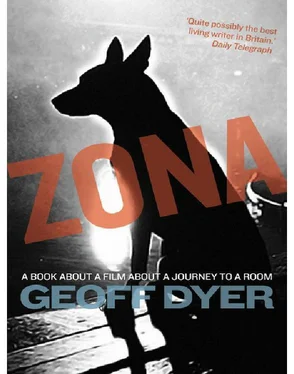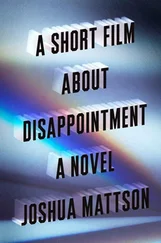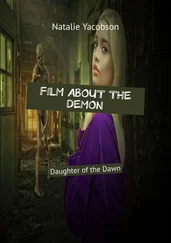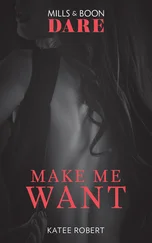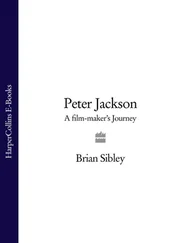Geoff Dyer - Zona - A Book About a Film about a Journey to a Room
Здесь есть возможность читать онлайн «Geoff Dyer - Zona - A Book About a Film about a Journey to a Room» весь текст электронной книги совершенно бесплатно (целиком полную версию без сокращений). В некоторых случаях можно слушать аудио, скачать через торрент в формате fb2 и присутствует краткое содержание. Год выпуска: 2012, Издательство: Text Publishing, Жанр: Критика, Публицистика, на английском языке. Описание произведения, (предисловие) а так же отзывы посетителей доступны на портале библиотеки ЛибКат.
- Название:Zona: A Book About a Film about a Journey to a Room
- Автор:
- Издательство:Text Publishing
- Жанр:
- Год:2012
- ISBN:нет данных
- Рейтинг книги:4 / 5. Голосов: 1
-
Избранное:Добавить в избранное
- Отзывы:
-
Ваша оценка:
- 80
- 1
- 2
- 3
- 4
- 5
Zona: A Book About a Film about a Journey to a Room: краткое содержание, описание и аннотация
Предлагаем к чтению аннотацию, описание, краткое содержание или предисловие (зависит от того, что написал сам автор книги «Zona: A Book About a Film about a Journey to a Room»). Если вы не нашли необходимую информацию о книге — напишите в комментариях, мы постараемся отыскать её.
as 'possibly the best living writer in Britain', takes on his biggest challenge yet: unlocking the film that has obsessed him all his adult life. Magnificently unpredictable and hilarious (and surely one of the most unusual books ever written about cinema),
takes the reader on an enthralling, thought-provoking journey.
The ostensible subject of
is the film
, by the great Russian director Andrei Tarkovsky. As Dyer immerses us in the movie, it becomes apparent that
is only the point of departure for a wonderfully digressive exploration of cinema, of how we understand our obsessions and of how we try to realise — and, discover — our deepest wishes.
'An impassioned, yet acerbic and witty appraisal of a screen classic is a work of art in its own rights.'
Zona: A Book About a Film about a Journey to a Room — читать онлайн бесплатно полную книгу (весь текст) целиком
Ниже представлен текст книги, разбитый по страницам. Система сохранения места последней прочитанной страницы, позволяет с удобством читать онлайн бесплатно книгу «Zona: A Book About a Film about a Journey to a Room», без необходимости каждый раз заново искать на чём Вы остановились. Поставьте закладку, и сможете в любой момент перейти на страницу, на которой закончили чтение.
Интервал:
Закладка:
TIME TO GET GOING. They step through the doorless doorway, the way. Writer, indulging in a last bit of baiting, tells Stalker he won’t forgive him. As he does so we see what it is that he’s been weaving together: a crown of thorns, no less. He puts it on and, credit where it’s due, it fits him like a glove — but it’s not a glove, of course, it’s a crown of thorns. Ring any bells? Something biblical going on there? An allusion to Bob Dylan’s ‘Shelter from the Storm’? Writer as Christ? I dunno. Everything just is. Or isn’t. But may be. So we’ll have to leave it at that. Writer is wearing a crown of thorns of his own making but attempting to say exactly what this symbolizes or means is like making a rod for your own back. Quite an achievement, this, to have someone wearing a crown of thorns and to leave us the option of not buying into a theological or symbolic reading of something that seems to exist solely — it keeps you neither warm nor dry — in the realm of the symbolic. Tarkovsky’s hostility to symbolic readings of his films extended to questions about the meaning of the Zone itself: ‘I’m reduced to a state of fury and despair by such questions. The Zone doesn’t symbolize anything, any more than anything else does in my films: the zone is the zone, it’s life, and as he makes his way across it a man may break down or he may come through.’ Ah, so the Zone is more than just a zone — it is, as Tarkovsky himself conceded, ‘a test.’ 41
Professor is distracted by the whining of the dog who sits on his haunches before the skeletal remains of two figures rotting in the dust, prior visitors — pilgrims or saboteurs? — who have perished for reasons that will never be revealed, which is not to say that they perished for no reason. The camera moves in on the perished pair: skeletons locked in a skeletal embrace.
THEY ARE IN a big, abandoned, derelict, dark damp room with what look like the remains of an enormous chemistry set floating in the puddle in the middle, as if the Zone resulted from an ill-conceived experiment that went horribly wrong. Off to the right, through a large hole in the wall, is a source of light that they all look towards. For a long while no one speaks. The air is full of the chirpy chirpy cheep cheep of birdsong. It’s the opposite of those places where the sedge has withered from the lake and no birds sing. The birds are whistling and chirruping and singing like mad. Stalker tells Writer and Professor — tells us —that we are now at the very threshold of the Room. This is the most important moment in your life, he says. Your innermost wish will be made true here. And we believe him. This is the purpose of the journey, to make us believe the literal truth of what Stalker says at this point. Ideally, one would live one’s whole life as though at this threshold; every moment would be like the one that is imminent. Not that you have to wish for anything explicitly, Stalker explains. You just have to concentrate on your past life. This makes the moment you enter the Room seem like death, when your life flashes before your eyes, when you look back on your life and assess its futility in the face of its absolute finitude and unrepeatability (or, if you are a Nietzschean, its eternal repeatability— repeatable but unvarying, which amounts to the same thing). Stalker grows reflective. When a man thinks of the past he becomes kinder, he says. A lovely idea, but manifestly untrue. There comes a point in your life when you realize that most of the significant experiences — aside from illness and death — lie in the past. To that extent the past is far more appealing than the future. The older you get the more time you spend thinking about the past, the things that have happened. Old people spend almost all of their time thinking about the past. But if their faces are anything to go by, this past fills them with bitterness as often as tenderness. The past becomes a source of regret; you think of hopes that were unrealized, disappointments, betrayals, failures, deceptions, all the things that led to this point which could be so different, so much better, but which, however you reshuffle the deck, always ends up at this point, leaves you holding — and lacking— the same cards.
But the most important thing…Stalker is in a state of more acute anxiety at this point than we have ever seen. Or is he? It is as difficult to find the right word to describe his expression — or expressions, plural, for his face seems to be running the full gamut of emotions every fraction of a second, or rather it is expressing a whole range of emotions simultaneously — as it is for him to say what is the most important thing about this moment. It is a mixture of exhaustion, turmoil, sincerity and hopelessness and… His back is to the others. He walks away from them. The most important thing is…to believe. To believe in this moment, in the Room, is to bring its power into existence. If you believe it will work it will work.
Stalker is talking about belief and one can see why, but, strictly speaking, I think he means faith. The difference, according to Alan Watts in The Wisdom of Insecurity, is that ‘the believer will open his mind to the truth on the condition that it fits in with his preconceived ideas and wishes. Faith, on the other hand, is an unreserved opening of the mind to the truth, whatever it may turn out to be. Faith has no preconceptions; it is a plunge into the unknown. Belief clings, but faith lets go.’ But then Miguel de Unamuno, in Tragic Sense of Life, says that faith ‘is faith in hope; we believe what we hope for’, as though faith and belief are one and the same. Or, again: ‘Hope is the reward of faith. Only he who believes truly hopes; and only he who truly hopes believes. We only believe what we hope, and we only hope what we believe.’ Hmm… Here we are, on the threshold of the Room, and these two back-of-the-alphabet thinkers have got us into a right old pickle about faith, hope and belief when we’re meant to be concentrating on what we most want from life— which is definitely to not get distracted by a semantic squabble about faith, hope, belief and the extent to which they are or are not compatible with each other or with the desire for a lifetime’s supply of free knapsacks.
Now you can go, says Stalker. Who wants to be first? Writer? It occurs to us, at this point, that it never crossed our minds that Professor and Writer really came to the Zone so that their deepest wishes could come true. In their different ways they were just curious. They wanted to see what the Zone was like, to see if it had the power to do what it claimed. Well, they’re pretty convinced that it does. Which helps explain why Writer doesn’t want to go at all. Thinking of the past won’t make him kinder. Thinking of the past will make him think of bad reviews, prizes that went to other people, acclaim that should have been his, poor sales, not getting on three-for-two/frontof-shop promotions, loss of inspiration — all the things that he came to the frigging Zone to get shot of in the first place. So, no thanks. Perfectly natural. Not many people can confront the truth about themselves. If they did they’d run a mile, would take an immediate and profound dislike to the person in whose skin they’d learned to sit quite tolerably all these years. Not to have to face up to the truth about oneself is probably high up on anyone’s actual — as opposed to imagined — wish list. Jung claimed that ‘people will do anything, no matter how absurd, in order to avoid facing their own souls.’ What could be more absurd than to go to the Zone precisely for a rendezvous with one’s own soul — and then, at the last moment, decide against it? Except if evasion really is the name and purpose of the game, then this kind of last-minute change of heart is perfectly logical, a way of confirming, absolutely, that avoidance rather than revelation is the goal. Besides, says Writer, putting down the crown of thorns, don’t you think it’s humiliating, all this snivelling and praying? This is a bit rich, given how he was snivelling and whining back there on the edge of the tubular abyss. But he’s right, of course, Stalker is pretty snivelling — but then who wouldn’t be if they’d spent the day sleeping in wet puddles with only a soaking-wet coat as a blanket? What’s wrong with praying? Stalker wants to know, not taking it personally. Well, for a start, it was developed— according to Nietzsche — to give stupid people something to do with their hands, to stop them fidgeting and making a nuisance of themselves in the quiet, sacred places of the earth. Never having got close to a condition of prayer — at school it seemed a question of holding your hands together and waiting for time to pass; in church, at funerals and weddings, it meant bowing your head and looking at your shoes and waiting for the whole thing to be over with so you could get stuck into the waiting flutes of champagne — I tend to agree. Bresson’s Country Priest is forced to remind himself that ‘the desire to pray is already prayer’, but Stalker has no need of crumbled solace. His life is constant prayer, he’s sort of praying even when he’s not praying, when he’s standing there with his brow getting more furrowed by the moment, having faith in what he hopes for and hoping for what he believes in or whatever. In the background, meanwhile, Professor is fiddling around, making something, maybe making a bigger and better crown of thorns than the one put together by Writer. Maybe that’s his wish: to win the crown of thorns-making competition! I’m serious. We think we have huge goals in life but actually, when it comes to it, we’ll settle quite happily for something trivial that we’ve had all the time and which made our lives bearable. I remember one of several conversations with my mum and dad about what they’d do if they won the football pools. The football pools: that, for many British people, was their equivalent of the Room, the thing that would make all their wishes come true. ‘All I’d like to do,’ my mum said with a mixture of pride and humbleness, ‘is go down to the supermarket and buy the nicest piece of steak there. That’s all I want.’ ‘You could do that NOW!’ I yelled. What she really wanted was to forego the thing— things, actually, because she could probably have afforded to eat steak from the supermarket every day for the rest of her life — that she claimed she wanted. (In stark contrast to today’s generation of consumers, who have no fear of getting into debt, my parents drummed into my head a very simple economy of expenditure: If you can’t afford it, go without. Actually, that first part—’If you can’t afford it’—was pretty superfluous since this was less about economics than an entire philosophy of ‘going without’.) On one occasion when my wife and I took my parents out for dinner (an unusual event as they hated going to restaurants), we were surprised to see that my mum had actually eaten all of her steak. Then, when we got back home, we found that she had squirrelled half of it away and brought it home wrapped up in a napkin in her handbag. These meat-related sources of regret seem to run deep in my family. When my mother was in the early stage of what proved to be her terminal illness my father said that on occasions she did buy steak from the supermarket, always the cheapest cuts, and it was ‘never very nice.’ He also said that he had regrets about their diet of the last fifty years. He wished they ‘had eaten more fat.’ Not meat, fat . That would have been an excellent wish to have taken into the Room. Imagine: your deepest wish is that you had eaten more fat. This is to slightly misrepresent the Room, however, for Stalker never claims that the Room’s powers are retrospective. You can go into the Room and eat all the fat you like from now on but you can’t transform the life you have led into one in which, even during the lean years, you ate heaps of fat.
Читать дальшеИнтервал:
Закладка:
Похожие книги на «Zona: A Book About a Film about a Journey to a Room»
Представляем Вашему вниманию похожие книги на «Zona: A Book About a Film about a Journey to a Room» списком для выбора. Мы отобрали схожую по названию и смыслу литературу в надежде предоставить читателям больше вариантов отыскать новые, интересные, ещё непрочитанные произведения.
Обсуждение, отзывы о книге «Zona: A Book About a Film about a Journey to a Room» и просто собственные мнения читателей. Оставьте ваши комментарии, напишите, что Вы думаете о произведении, его смысле или главных героях. Укажите что конкретно понравилось, а что нет, и почему Вы так считаете.
